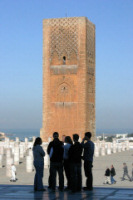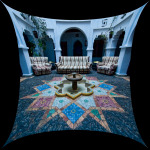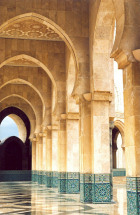
The Kingdom of Morocco is the most westerly of the North
African countries. For centuries Morocco has been drawing
travelers who have a spirit of adventure. For many travelers the
country provides the first taste of Islam, Africa and the
developing world. The ancient Arabs knew Morocco as Al-Maghreb
al-Aqsa, the ‘Farthest Land of the Setting Sun’. From Ceuta, the
Spanish coast is only a one-hour ferry ride away and Morocco has
long been the gateway for Europeans into Africa. The country has
a wealth of experiences to offer, including a diverse cultural
history and a rich architectural tradition, which has left a
colorful tapestry of medieval cities, Roman ruins, Berber
kasbahs, and beautiful Islamic monuments.

The Phoenician and Roman Empires stretched up
to Morocco; Vandals and Byzantines invaded; Arabs conquered
North Africa in the 7th century; Jews settled centuries ago;
Moroccan dynasties rose and fell; the Portuguese, the French and
Spanish have all been here and left their marks.
Berber tribes: Morocco is still populated by the descendants of
an ancient race that has inhabited Morocco since Neolithic
times. Though the country has long been dominated by the Arabs,
Berbers have managed to hang onto their culture with amazing
tenacity.
Islam in Morocco
Islam, the faith of most Moroccans except a diminishing
Jewish community and a small European colony, provides the
foundation for the nation's spiritual life and the
traditional social system. Practice in many regions is
unorthodox and the demands of industrialization organization
have made the traditional devotion difficult for those
employed in the modern sector. The constitution guarantees
freedom of religion, describes the nation as Muslim and the
king as the "Amir El Mouminin", or commander of the
faithful. Although many practices and beliefs of the
Berbers, as well as other rural and urban inhabitants,
 deviate from, the orthodox Islam of the Koran, personal
devotion to the religion has rarely wavered. The Islam
practiced in Morocco is considerably less strict than that
in other parts of the Muslim world, although Moroccans
follow Islam to the letter during Ramadan, the holy month.
deviate from, the orthodox Islam of the Koran, personal
devotion to the religion has rarely wavered. The Islam
practiced in Morocco is considerably less strict than that
in other parts of the Muslim world, although Moroccans
follow Islam to the letter during Ramadan, the holy month.
Islam and The West
Misconceptions about the nature of Islam
abound. Ever since the Crusades, fearful images Muslims have
dominated the Western subconscious and terrorist
associations are especially strong after September 11th.
Counter to these stereotypes, Moroccans are widely
recognized for their warmth and hospitality to visitors.
Perceptible differences between Islamic and Western
worldviews may be a source of conflict and contention, but
they are also hold potential for profound insight into both
cultures and individuals. Unlike Western societies where
atheism is acceptable or even fashionable, for the Moroccan
a life without God would be unthinkable. Islam is a very
important element in their lives, and one that Moroccans
love to discuss. For travelers open to heightening their
cultural and self awareness, Morocco offers countless
opportunities for genuine cross-cultural connection.



 deviate from, the orthodox Islam of the Koran, personal
devotion to the religion has rarely wavered. The Islam
practiced in Morocco is considerably less strict than that
in other parts of the Muslim world, although Moroccans
follow Islam to the letter during Ramadan, the holy month.
deviate from, the orthodox Islam of the Koran, personal
devotion to the religion has rarely wavered. The Islam
practiced in Morocco is considerably less strict than that
in other parts of the Muslim world, although Moroccans
follow Islam to the letter during Ramadan, the holy month.
